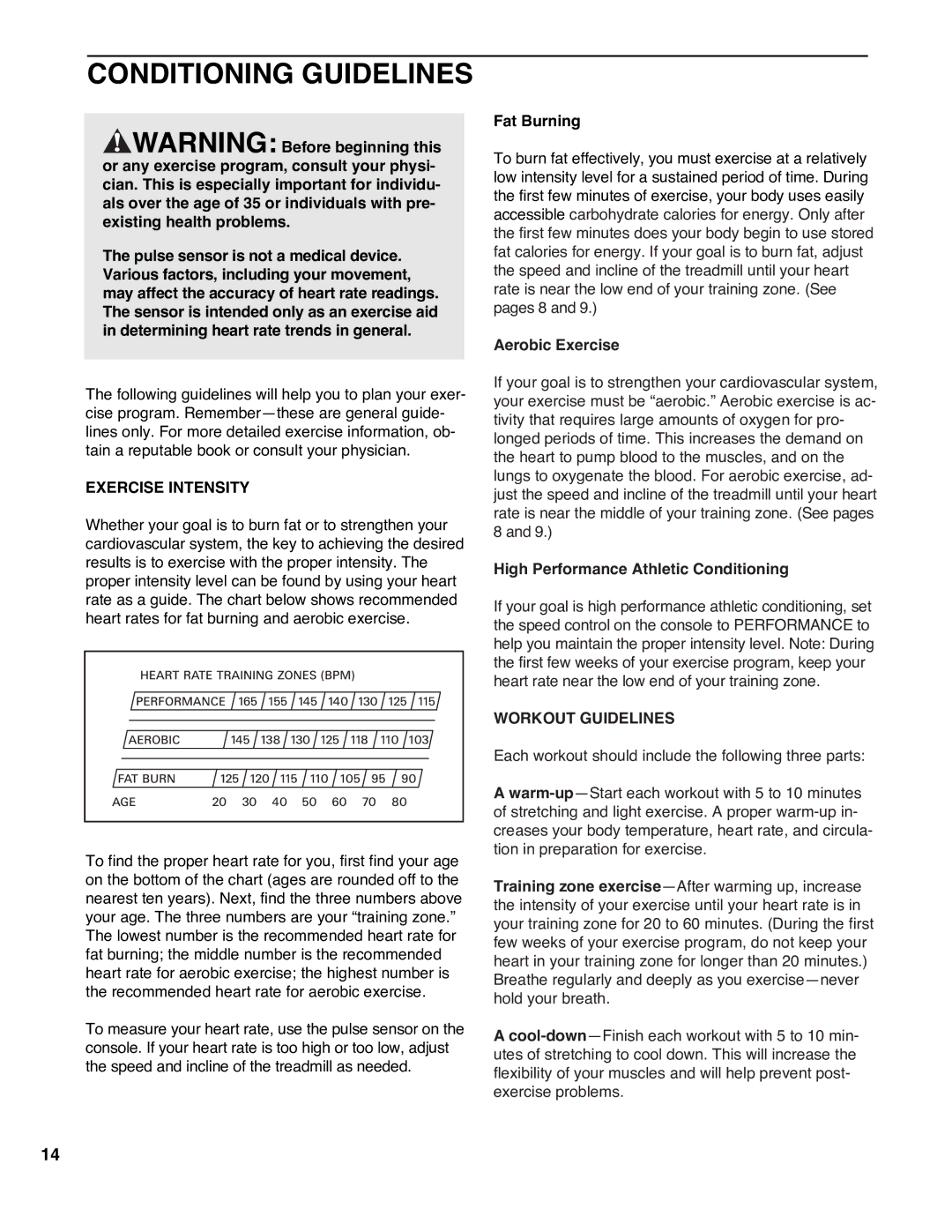
CONDITIONING GUIDELINES
![]() WARNING: Before beginning this or any exercise program, consult your physi- cian. This is especially important for individu- als over the age of 35 or individuals with pre- existing health problems.
WARNING: Before beginning this or any exercise program, consult your physi- cian. This is especially important for individu- als over the age of 35 or individuals with pre- existing health problems.
The pulse sensor is not a medical device. Various factors, including your movement, may affect the accuracy of heart rate readings. The sensor is intended only as an exercise aid in determining heart rate trends in general.
The following guidelines will help you to plan your exer- cise program. RememberÑthese are general guide- lines only. For more detailed exercise information, ob- tain a reputable book or consult your physician.
EXERCISE INTENSITY
Whether your goal is to burn fat or to strengthen your cardiovascular system, the key to achieving the desired results is to exercise with the proper intensity. The proper intensity level can be found by using your heart rate as a guide. The chart below shows recommended heart rates for fat burning and aerobic exercise.
To find the proper heart rate for you, first find your age on the bottom of the chart (ages are rounded off to the nearest ten years). Next, find the three numbers above your age. The three numbers are your Òtraining zone.Ó The lowest number is the recommended heart rate for fat burning; the middle number is the recommended heart rate for aerobic exercise; the highest number is the recommended heart rate for aerobic exercise.
To measure your heart rate, use the pulse sensor on the console. If your heart rate is too high or too low, adjust the speed and incline of the treadmill as needed.
Fat Burning
To burn fat effectively, you must exercise at a relatively low intensity level for a sustained period of time. During the first few minutes of exercise, your body uses easily accessible carbohydrate calories for energy. Only after the first few minutes does your body begin to use stored fat calories for energy. If your goal is to burn fat, adjust the speed and incline of the treadmill until your heart rate is near the low end of your training zone. (See pages 8 and 9.)
Aerobic Exercise
If your goal is to strengthen your cardiovascular system, your exercise must be Òaerobic.Ó Aerobic exercise is ac- tivity that requires large amounts of oxygen for pro- longed periods of time. This increases the demand on the heart to pump blood to the muscles, and on the lungs to oxygenate the blood. For aerobic exercise, ad- just the speed and incline of the treadmill until your heart rate is near the middle of your training zone. (See pages 8 and 9.)
High Performance Athletic Conditioning
If your goal is high performance athletic conditioning, set the speed control on the console to PERFORMANCE to help you maintain the proper intensity level. Note: During the first few weeks of your exercise program, keep your heart rate near the low end of your training zone.
WORKOUT GUIDELINES
Each workout should include the following three parts:
A
Training zone exerciseÑAfter warming up, increase the intensity of your exercise until your heart rate is in your training zone for 20 to 60 minutes. (During the first few weeks of your exercise program, do not keep your heart in your training zone for longer than 20 minutes.) Breathe regularly and deeply as you exerciseÑnever hold your breath.
A
14
